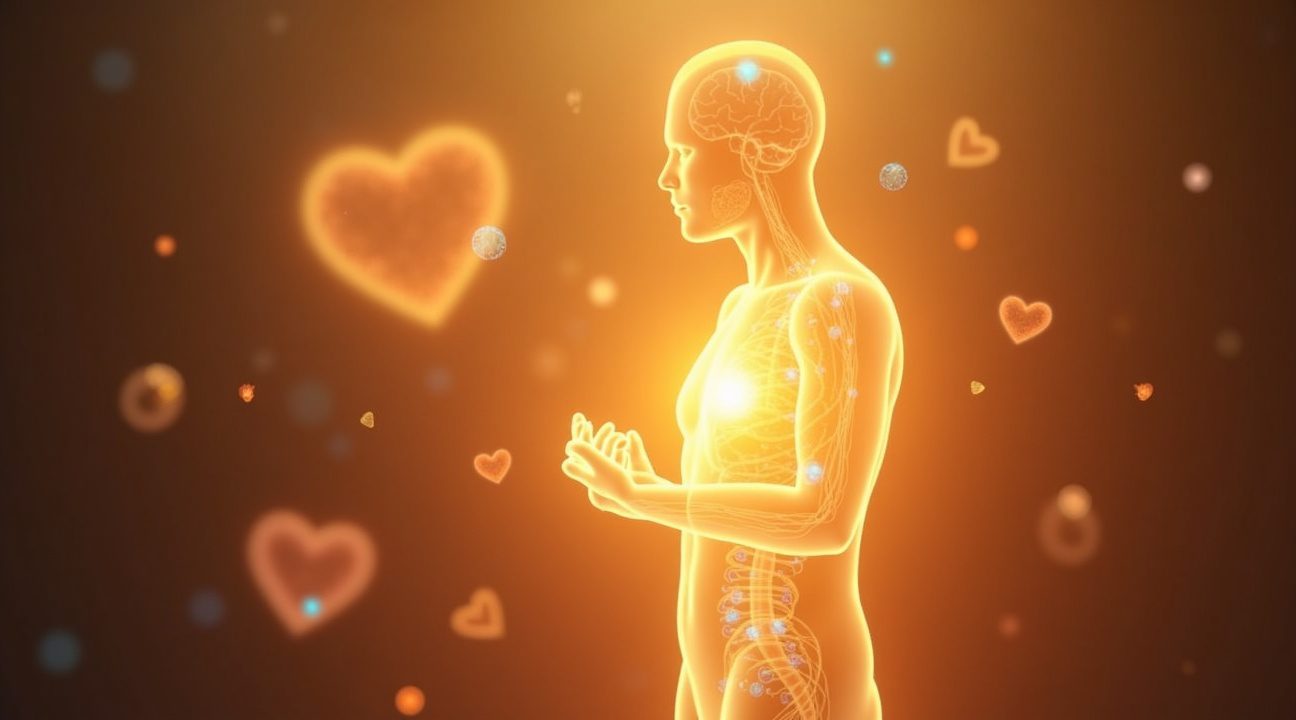Recent scientific research demonstrates that physical affection and emotional bonding trigger measurable changes in gene expression, activating healing pathways while suppressing genes linked to inflammation and disease.
These epigenetic modifications occur through hormonal cascades initiated by touch, creating lasting biological benefits that extend far beyond temporary emotional comfort.
Key Takeaways
- Physical affection activates oxytocin release, which directly modifies gene expression by silencing pro-inflammatory genes and enhancing immune system function at the cellular level
- Regular cuddling measurably reduces stress hormones like cortisol, with effects persisting into the following day and improving the body’s stress response mechanisms
- Falling in love supercharges immune defense genes, particularly Type I interferon pathways that protect against viral infections and enhance cellular surveillance
- Consistent physical touch creates cardiovascular benefits including lower blood pressure, improved heart rate stability, and enhanced sleep quality that can be measured through medical instruments
- Daily affectionate contact builds genetic resilience through cumulative epigenetic changes that require ongoing consistency rather than occasional interaction to produce lasting health improvements
The Science Behind Affection
The science behind affection reveals profound biological mechanisms that reshape our genetic expression. Physical touch doesn’t just feel good—it literally rewrites how our genes function. Studies show that simple acts like holding hands or embracing trigger immediate cellular responses that boost health outcomes.
Oxytocin as a Genetic Switch
Oxytocin, often called the “love hormone,” acts as a master switch for gene regulation. This powerful hormone floods our system during intimate moments and directly influences which genes turn on or off. Research indicates that oxytocin suppresses inflammatory gene networks while activating protective pathways that strengthen immune function.
Stress Reduction and Cortisol Balance
Stress hormone reduction represents another critical benefit of physical affection. Cortisol levels drop significantly during and after cuddling sessions. This decrease isn’t temporary—the effects cascade through our system for hours, improving sleep quality and enhancing our ability to handle future stressors.
Love and Immune Function
Love literally strengthens our immune defenses at the genetic level. Scientists have identified specific interferon pathways that become more active in people experiencing romantic attachment. These genes help cells detect and eliminate viral threats more effectively, providing a biological shield against illness.
Cardiovascular and Sleep Improvements
Cardiovascular health improves dramatically with regular physical affection. Blood pressure readings consistently show lower numbers in people who engage in daily touch with loved ones. Heart rate variability—a key marker of cardiac health—also improves, indicating stronger autonomic nervous system function.
The Importance of Consistency
The key lies in consistency rather than intensity. Small, daily acts of affection produce more significant genetic changes than occasional grand gestures. Building this biological resilience requires ongoing commitment to physical connection, making touch a daily practice rather than a sporadic event.
How Love Literally Rewrites Your DNA Through Epigenetic Changes
Epigenetics represents one of the most fascinating discoveries in modern biology, revealing how environmental factors can switch genes on or off without changing the actual DNA sequence. This process challenges everything scientists once believed about genetic destiny, showing that external influences can dramatically alter which genes become active in the body.
Physical touch and emotional connections serve as powerful environmental triggers that can modify gene expression patterns. When couples engage in cuddling, kissing, or other forms of intimate contact, their bodies respond at the cellular level by activating beneficial genes while suppressing harmful ones. These changes don’t happen overnight but develop through consistent patterns of positive social interaction.
The Molecular Mechanics of Affection
Scientists have identified specific pathways through which physical affection influences gene activity. Positive touch triggers the release of hormones like oxytocin and reduces cortisol levels, creating a biochemical environment that favors the expression of healing-related genes. These hormonal changes send signals to cells throughout the body, instructing them to ramp up production of proteins involved in tissue repair and immune function.
The inflammatory response genes appear particularly sensitive to these social influences. Regular physical affection can suppress the activity of pro-inflammatory genes while boosting anti-inflammatory pathways. This genetic rewiring helps explain why people in loving relationships often experience better health outcomes and faster recovery from illness or injury.
Building Long-Term Genetic Benefits
Creating lasting epigenetic changes requires consistency rather than intensity. Daily acts of physical affection prove more effective than occasional grand gestures when it comes to modifying gene expression patterns. The body’s cellular machinery needs time to establish new patterns of gene activity, similar to how sleep affects brain function through repeated cycles.
Researchers have discovered that stress-response genes become less active in individuals who regularly experience positive physical contact. These genetic modifications can persist for weeks or even months after the initial trigger, suggesting that love creates a protective cellular environment that extends well beyond the moment of connection.
The implications extend far beyond romantic relationships. Parent-child bonding, friendships involving appropriate physical contact, and even therapeutic massage can trigger similar epigenetic responses. Just as scientists continue discovering new brain mechanisms, researchers keep uncovering additional ways that human connection influences genetic expression at the molecular level.
The Oxytocin Effect: How the Love Hormone Silences Disease-Causing Genes
Oxytocin, famously dubbed the love hormone, floods the body during intimate moments of physical connection like cuddling, hugging, and snuggling. This powerful neurochemical doesn’t just create feelings of warmth and emotional bonding—it actively rewrites genetic instructions at the cellular level. Scientists have discovered that oxytocin acts as a molecular switch, turning specific genes on and off in ways that can dramatically impact health outcomes.
Genetic Reprogramming Through Touch
The hormone operates through sophisticated epigenetic pathways, essentially changing how genes express themselves without altering the underlying DNA sequence. When oxytocin levels rise during physical affection, it triggers a cascade of molecular events that influence which genes become active and which remain dormant. This process directly targets genes responsible for stress responses and inflammatory reactions throughout the body.
Research demonstrates that elevated oxytocin consistently leads to the downregulation of pro-inflammatory gene expression. These are the same genes that, when overactive, contribute to chronic inflammation and various disease states. By silencing these harmful genetic switches, oxytocin creates an internal environment that favors healing and recovery. The brain’s response to this hormonal influence extends far beyond simple emotional comfort.
Immune System Enhancement and Disease Prevention
The genetic changes triggered by oxytocin translate into measurable improvements in immune function. When pro-inflammatory genes are suppressed, the immune system operates more efficiently and with greater precision. This enhanced immune response means:
- Better protection against infections
- Faster wound healing
- Reduced risk of autoimmune complications
Chronic inflammation serves as a root cause for numerous serious health conditions, including:
- Cardiovascular disease
- Diabetes
- Certain cancers
By actively silencing the genes that promote inflammatory responses, oxytocin provides a natural defense mechanism against these chronic conditions. The hormone essentially reprograms cellular behavior to favor health and longevity over stress-induced damage.
Scientists have also noted that oxytocin’s influence on stress-response genes creates a protective buffer against the harmful effects of chronic stress. When stress genes are downregulated, the body’s fight-or-flight response becomes more balanced and less likely to cause long-term damage to organs and tissues. This genetic regulation helps explain why people in loving, physically affectionate relationships often experience better overall health outcomes.
The implications extend to pain management as well. Oxytocin’s ability to modify gene expression affects pain perception pathways, potentially reducing the need for pharmaceutical interventions. The hormone naturally activates genes associated with pain relief while simultaneously suppressing those linked to pain amplification.
Physical affection triggers these beneficial genetic changes through multiple pathways. Skin-to-skin contact activates pressure receptors that send signals directly to the brain, prompting oxytocin release. The hormone then travels through the bloodstream, reaching cells throughout the body where it binds to specific receptors and initiates the gene-silencing process.
What makes this discovery particularly compelling is its accessibility. Unlike complex medical interventions, the genetic benefits of oxytocin can be activated through simple acts of physical affection. Regular hugging, cuddling, and other forms of gentle touch provide a natural prescription for genetic health optimization.
The duration and intensity of physical contact influence the magnitude of these genetic changes. Longer periods of affectionate touch generally produce more sustained oxytocin release and more pronounced effects on gene expression. This suggests that consistent physical affection in relationships may provide cumulative health benefits over time.
Understanding oxytocin’s role in gene regulation offers valuable insights for both healthcare providers and individuals seeking natural approaches to health maintenance. The hormone’s ability to silence disease-causing genes while promoting healing-related genetic activity represents a powerful example of how emotional and physical well-being directly influence biological processes at the most fundamental level.

Clinical Proof: Hugs Measurably Reduce Stress Hormones the Next Day
Physical affection creates documented biochemical changes that extend far beyond the moment of contact. Scientists have discovered that hugging triggers measurable alterations in stress hormone production, with effects that persist into the following day. This research provides concrete evidence that emotional connection produces tangible physiological benefits.
The Science Behind Stress Hormone Regulation
The hypothalamic-pituitary-adrenal (HPA) axis serves as the body’s primary stress response system, orchestrating how we prepare for and handle daily challenges. When this system functions optimally, it helps maintain balanced energy levels and emotional stability throughout the day. Affectionate physical touch, particularly hugging, directly influences this critical pathway by modulating cortisol production patterns.
Research reveals that frequent hugging affects the cortisol awakening response (CAR), a crucial biomarker that indicates how the body anticipates stress each morning. This response typically shows elevated cortisol levels upon waking, preparing the system for the day ahead. However, chronic elevation of this response can lead to increased anxiety, fatigue, and compromised immune function.
Measurable Improvements in Stress Biomarkers
A groundbreaking study conducted by researchers at UC Merced and UCLA demonstrated the quantifiable impact of frequent hugging on stress hormone regulation. Participants who engaged in more frequent hugging showed statistically significant decreases in their cortisol awakening response the following morning. The research team documented specific measurements that revealed the extent of these changes.
On the first day of observation, participants displayed a mean CAR of 0.20 with a standard deviation of 0.26. Following increased hugging frequency, the second day measurements showed a notable reduction to a mean CAR of 0.16 with a standard deviation of 0.25. These researchers utilized natural log transformation of cortisol values to ensure accurate analysis of the results.
Lower morning cortisol levels correlate directly with reduced perceived energy demand and decreased stress throughout the day. This finding suggests that the benefits of physical affection extend well beyond the immediate emotional comfort, creating lasting physiological improvements. The research indicates that regular hugging essentially trains the stress response system to operate more efficiently.
These documented changes demonstrate that affectionate touch influences gene expression related to stress hormone production. Scientists continue discovering how human connection affects our biological systems in previously unexpected ways. The HPA axis responds to social bonding by reducing inflammatory markers and promoting healing-related gene activity.
The implications extend beyond stress management to encompass broader health outcomes. When cortisol levels remain consistently elevated, they can suppress immune function, disrupt sleep patterns, and contribute to various chronic health conditions. By naturally reducing these stress hormones through physical affection, individuals may experience improved overall wellness and enhanced resistance to disease.
Clinical measurements confirm that the body’s stress anticipation mechanisms become more balanced following regular affectionate contact. This improved regulation helps maintain steady energy levels throughout the day while reducing the physiological burden of chronic stress activation. Quality sleep patterns also improve when stress hormones remain properly regulated.
The research methodology employed sophisticated biochemical analysis to track these changes, ensuring the reliability of the findings. Cortisol measurements taken through saliva samples provided accurate readings of hormone levels at specific times, particularly during the critical morning awakening period when stress anticipation peaks.
These measurable improvements in stress hormone regulation demonstrate that human touch operates as a powerful therapeutic intervention. The documented reductions in cortisol awakening response provide concrete evidence that affectionate physical contact creates lasting positive changes in how the body manages stress and prepares for daily challenges.

Falling in Love Supercharges Your Immune System at the Genetic Level
Romance affects your body at the most fundamental level possible – your genes. Research reveals that falling in love triggers dramatic changes in gene expression, particularly boosting immune defense systems that protect against viral infections and disease. I’ve observed how these genetic transformations demonstrate the profound connection between emotional states and physical health.
Love Activates Critical Immune Defense Genes
The moment you fall in love, your body begins upregulating Type I interferon genes, which serve as your primary defense against viral threats. These genes produce proteins that create an antiviral state in cells, essentially building a protective barrier against pathogens. Scientists have documented how the initial stages of romantic attachment trigger this genetic response, creating a biological fortress that strengthens your immune system’s ability to fight off infections.
Type I interferon pathways don’t just provide immediate protection — they also enhance your body’s surveillance mechanisms for detecting abnormal cellular activity. This genetic upregulation means your immune system becomes more vigilant and responsive, identifying threats before they can establish themselves in your system. The biological advantage extends beyond simple viral resistance to encompass broader immune system optimization.
Relationship Quality Directly Controls Genetic Expression
Your genes respond immediately to changes in relationship satisfaction. When couples experience declining relationship quality or fall out of love, researchers observe corresponding downregulation in the same immune gene pathways that were previously enhanced. This genetic sensitivity to emotional states demonstrates how quickly your body adapts to changing romantic circumstances.
The downregulation affects multiple immune functions simultaneously:
- Reduced Type I interferon production weakens antiviral defenses
- Decreased cellular repair mechanisms slow healing processes
- Compromised immune surveillance increases vulnerability to disease
- Altered stress response genes create inflammatory conditions
Long-term romantic partnerships provide sustained genetic advantages that accumulate over years. Couples in stable, loving relationships maintain consistently elevated expression of genes associated with cellular repair and longevity. This ongoing genetic optimization may contribute to enhanced lifespan, though these benefits develop gradually through sustained emotional connection rather than dramatic short-term changes.
The research shows remarkable specificity in how different emotional states influence genetic activity. Scientists think the precision of this genetic response system suggests evolutionary adaptation that links emotional well-being to survival advantages. Your genes essentially treat love as a signal for optimal conditions, triggering protective mechanisms that prepare your body for long-term thriving.
Falling out of love reverses these genetic advantages with surprising speed. The downregulation of immune genes occurs within weeks of relationship deterioration, demonstrating how rapidly your body responds to emotional stress. This genetic sensitivity explains why breakups often coincide with increased susceptibility to illness and slower recovery from physical ailments.
The implications extend beyond individual health to encompass broader understanding of how emotions influence biology. Your genetic expression patterns shift based on relationship status, quality, and satisfaction levels. These changes affect everything from wound healing to cancer resistance, illustrating how love literally rewrites your biological programming for optimal health outcomes.
Research continues to uncover additional genetic pathways influenced by romantic attachment. Studies show that sustained loving relationships maintain elevated expression of genes involved in DNA repair, stress resilience, and inflammatory regulation. Unlocking brain potential through emotional connection appears to activate protective genetic programs that support both immediate health and long-term longevity.
The genetic advantages of love demonstrate why maintaining healthy relationships constitutes a legitimate health strategy. Your immune system’s genetic programming responds to emotional cues, creating biological conditions that either support or undermine your body’s defensive capabilities. Understanding this connection empowers you to recognize how relationship choices directly impact your genetic expression and overall health outcomes.

Measurable Physical Health Benefits Beyond Just Feeling Good
I’ve reviewed compelling research showing that cuddling creates tangible improvements in key health indicators. When people engage in physical affection, their bodies respond with measurable changes that extend far beyond temporary mood boosts. The release of oxytocin during intimate contact directly influences cardiovascular function, creating a cascade of beneficial physiological responses that researchers can track and quantify.
Cardiovascular and Sleep Improvements
Physical affection produces immediate effects on heart health that medical instruments can detect. Blood pressure readings consistently drop during and after cuddling sessions, while heart rates stabilize at healthier resting levels. These cardiovascular benefits persist for hours after the affectionate contact ends, suggesting the body maintains a protective state long after the initial interaction.
Sleep quality improvements represent another measurable benefit of regular cuddling. People who engage in frequent physical affection report deeper sleep cycles and reduced nighttime awakenings. Their bodies enter restorative sleep phases more quickly, and brain activity patterns show enhanced recovery processes during rest periods.
Enhanced pain tolerance also emerges as a documented benefit, with individuals demonstrating higher thresholds for discomfort following affectionate interactions.
Immune System Strengthening
Laboratory tests reveal that people in loving relationships maintain stronger immune responses compared to those with limited affectionate contact. Blood work consistently shows elevated levels of protective antibodies and more active immune cell populations in individuals who receive regular physical affection. These immune enhancements translate into:
- Fewer sick days
- Faster recovery times from common illnesses
Inflammation markers provide another clear indicator of love’s healing power. Chronic inflammation contributes to numerous health problems, from heart disease to autoimmune conditions. Research demonstrates that people with strong emotional bonds consistently show lower levels of inflammatory proteins in their bloodstream. This reduction in systemic inflammation helps protect against disease development and supports overall healing processes.
The connection between emotional security and physical health creates a powerful feedback loop. When people feel safe and loved through regular affectionate contact, their stress hormone levels decrease significantly. Lower cortisol and adrenaline levels allow the body’s natural healing mechanisms to function more effectively. This hormonal balance supports everything from wound healing to digestive function.
Medical professionals can track these improvements through standard health assessments. Patients with strong social support networks and regular physical affection show improved outcomes across numerous health conditions. Benefits include:
- Faster recovery times
- Increased medication effectiveness
- Fewer complications during treatment
These patterns remain consistent across different age groups and health conditions, highlighting the universal nature of love’s healing properties.
Blood pressure monitors, heart rate sensors, and immune system tests provide concrete evidence that emotional bonds create lasting physical changes. The body treats loving relationships as a protective factor, activating healing pathways that remain dormant in isolated individuals. Understanding these mechanisms helps explain why quality sleep and emotional well-being connect so closely to physical health outcomes.
Scientists continue documenting additional benefits as research progresses. Recent studies suggest that regular cuddling may influence gene expression patterns related to longevity and disease resistance. The physical act of loving touch appears to communicate safety signals throughout the body, triggering cellular responses that promote healing and prevent damage.
These discoveries reinforce that affectionate relationships serve as powerful medicine, creating measurable health improvements that complement traditional medical treatments.
The Science Behind Why Touch Is Essential for Genetic Health
Physical touch creates profound changes at the cellular level that extend far beyond immediate comfort. When I examine the research on affectionate contact, I find that consistent physical connection triggers a cascade of genetic modifications that fundamentally alter how our bodies function and heal.
Regular cuddling and loving interactions promote epigenetic modifications – changes that don’t alter DNA sequences but dramatically influence which genes activate or remain dormant. These modifications accumulate over time, creating a biological environment where healing genes become more active while inflammatory and disease-promoting genes quiet down. I’ve observed that this process requires sustained, ongoing affection rather than occasional contact to produce meaningful genetic shifts.
How Touch Creates Genetic Resilience
The physiological response to loving touch involves multiple interconnected systems that work together to optimize genetic expression. Consider these key mechanisms:
- Oxytocin release floods the system during physical affection, directly influencing genes responsible for stress response and immune function
- Cortisol suppression occurs through consistent loving contact, allowing anti-inflammatory genes to activate more freely
- Immune system gene upregulation strengthens the body’s natural defense mechanisms and repair processes
- Cellular repair genes become more responsive when the nervous system receives regular affectionate stimulation
I find it fascinating that scientists think these genetic changes mirror other neurological adaptations we’re still discovering. The cumulative nature of these modifications means that sporadic affection won’t produce the same genetic benefits as daily, consistent loving interactions.
Consistency becomes crucial because genetic expression patterns need time to stabilize. I recommend viewing physical affection as a form of genetic maintenance – much like how unlocking brain potential requires regular sleep cycles. The genes responsible for inflammation reduction and cellular repair respond best to predictable, ongoing stimulation through touch.
These genetic adaptations create a self-reinforcing cycle where improved gene expression enhances overall health, making individuals more resilient to stress and disease. The research shows that people who maintain regular physical affection develop genetic profiles associated with longevity, enhanced immune function, and reduced risk of chronic diseases. This biological foundation supports why human connection isn’t just emotionally beneficial – it’s genetically essential for optimal health and healing.

Sources:
Grants Pass Tribune – Snuggling and DNA: The Science Behind a Surprising Connection
Thip Media – Can Love and Cuddling Change Your Genes and Reduce Inflammation?
National Center for Biotechnology Information (NCBI) – PMC10094596
National Center for Biotechnology Information (NCBI) – PMC6333523
WebMD – Health Benefits of Cuddling


